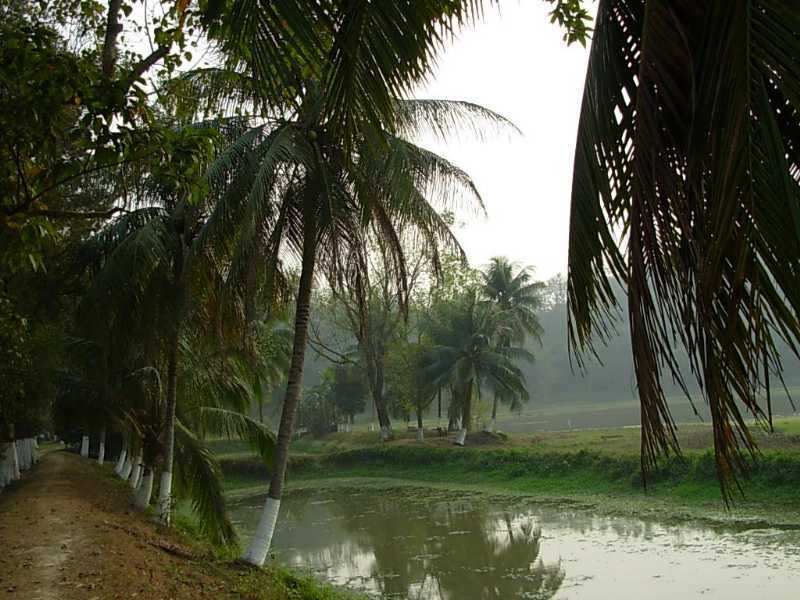Sualkuchi: The Heartbeat of Assam's Silk Weaving Tradition

Strong 8k brings an ultra-HD IPTV experience to your living room and your pocket.
Sualkuchi, located in the state of Assam, India, is a charming village known for its rich tradition of silk weaving. Often referred to as the "Manchester of Assam," Sualkuchi is famous for producing high-quality silk, especially Sualkuchi silk. This article will explore the history, culture, and significance of Sualkuchi and its silk industry, making it easy to understand the importance of this beautiful village.
The Heritage of Sualkuchi
The tradition of silk weaving in Sualkuchi dates back many centuries. This village has been a hub for silk production, and the skill has been passed down through generations of artisans. The main types of silk produced here are Muga silk, Eri silk, and Mulberry silk.
Muga silk is particularly special because it is unique to Assam. It has a beautiful golden hue and is known for its strength and durability. The Muga silkworm thrives only in the climatic conditions of Assam, making this silk a prized possession.
Eri silk is another important type of silk made from the Eri silkworm. It is soft, warm, and comfortable, making it ideal for shawls and garments.
Mulberry silk comes from the Bombyx mori silkworm, which feeds on mulberry leaves. This type of silk is known for its fine quality and smooth texture.
Together, these silks contribute to the rich weaving tradition of Sualkuchi Assam.
The Silk Weaving Process
The process of making Sualkuchi silk is both intricate and fascinating. It begins with the rearing of silkworms. Farmers carefully raise the silkworms and feed them specific leaves. Once the silkworms spin their cocoons, the cocoons are collected.
Next, the cocoons are boiled to extract the silk threads. This step is crucial, as it ensures the silk is ready for weaving. After extracting the threads, skilled artisans begin the weaving process.
The village is filled with traditional handlooms, where weavers work tirelessly to create beautiful fabrics. Each piece of Sualkuchi silk is unique, often featuring intricate designs and patterns inspired by nature and Assamese culture. The craftsmanship involved in weaving silk is remarkable and requires years of practice to perfect.
The Cultural Significance of Sualkuchi
Sualkuchi is not just a center for silk production; it is also a cultural hub. The village celebrates various festivals that highlight its rich traditions. One of the most important festivals is Bihu, which marks the Assamese New Year. During this festival, people wear traditional clothing made from Sualkuchi silk, showcasing their pride in their heritage.
The silk industry is deeply woven into the daily lives of the people in Sualkuchi. Many families rely on silk weaving for their livelihood, and the craft is considered a source of pride. The artisans take great care in their work, as each piece represents their skill and dedication.
Sualkuchi Silk in Fashion
In recent years, Sualkuchi silk has gained popularity in the fashion world. Designers are increasingly using Sualkuchi silk in their collections, recognizing its unique beauty and quality. The versatility of Sualkuchi silk makes it suitable for a wide range of garments, including sarees, stoles, and dress materials.
The demand for Sualkuchi silk has led to a revival of interest in traditional weaving techniques. Local artisans are now collaborating with fashion designers to create contemporary clothing while preserving the essence of traditional craftsmanship. This fusion of tradition and modern design has helped Sualkuchi silk gain recognition not just in India but also around the world.
Eco-Friendly Practices
The silk production process in Sualkuchi is largely eco-friendly. The artisans prioritize using natural dyes and traditional methods, which reduces the impact on the environment. The cultivation of silkworms and the rearing of plants for feeding them contribute positively to the local ecosystem.
By supporting the silk industry in Sualkuchi, consumers can help sustain traditional livelihoods and promote eco-friendly practices. This commitment to sustainability makes Sualkuchi silk an excellent choice for environmentally conscious shoppers.
Visiting Sualkuchi
For anyone interested in exploring the beauty and heritage of Sualkuchi, visiting the village is a rewarding experience. Located about 30 kilometers from Guwahati, the capital city of Assam, Sualkuchi is easily accessible by road.
Once in Sualkuchi, visitors can witness the silk weaving process firsthand. Many local artisans welcome tourists to their workshops, where you can see how silk is made and even try your hand at weaving on traditional looms. Engaging with the weavers allows you to appreciate the time and effort that goes into creating each piece of silk.
The local markets in Sualkuchi are vibrant and bustling with activity. Here, you can find a wide array of silk products, from sarees to stoles. Shopping for Sualkuchi silk is not just about buying beautiful garments; it’s also about supporting the local economy and celebrating the art of weaving.
Culinary Delights
While visiting Sualkuchi, don’t miss the chance to taste the local cuisine. Assamese food is known for its simplicity and unique flavors. Traditional dishes often include rice, fish, meat, and various vegetables. The use of local herbs and spices enhances the taste, making it a delightful experience for food lovers.
Sampling local delicacies not only satisfies your taste buds but also allows you to connect with the culture of the region. Many eateries in Sualkuchi offer authentic Assamese meals, providing a complete cultural experience.
Challenges Facing the Silk Industry
Despite its rich heritage, the silk industry in Sualkuchi faces several challenges. The rising cost of raw materials and competition from synthetic fabrics have impacted the livelihoods of many artisans. Additionally, the younger generation is often attracted to urban jobs, leading to a decline in traditional weaving practices.
To address these challenges, efforts are being made to promote Sualkuchi silk and provide better market access for artisans. Organizations and government initiatives aim to raise awareness about the importance of preserving traditional crafts and supporting local weavers.
Conclusion
Sualkuchi is more than just a village; it is a living testament to the art of silk weaving and the rich cultural heritage of Assam. The dedication and skill of its artisans have made Sualkuchi Assam silk a prized possession for many. By visiting Sualkuchi, you not only experience the beauty of this traditional craft but also support the livelihoods of those who have dedicated their lives to preserving it.
Whether you’re drawn to the stunning textiles, the rich culture, or the delicious cuisine, Sualkuchi offers a unique and unforgettable experience. Embrace the warmth of its people, explore its vibrant markets, and discover why Sualkuchi is truly a gem of Assam.
Note: IndiBlogHub features both user-submitted and editorial content. We do not verify third-party contributions. Read our Disclaimer and Privacy Policyfor details.


